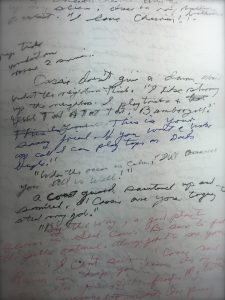Clues about Dementia Fiction
 This week I read a story from a last month’s New Yorker at 30,000 feet – Edwidge Danticat’s remarkable “Sunrise, Sunset.” Shuttling from one airport to another, crossing state lines, I enter the story in transition. She is there one second, then she is not. She knows exactly where she is, then she does not. I encounter the central character, Carole; I encounter turbulence. I stay in the same time zone while Carole loses track of time. I move page by page through a nonlinear narrative, looping back through fictive and family memories, through literary history. Danticat’s story uncovers new dimensions in altered states, altering them for the confines of words, sentences, the page. It assumes an emergent mode that I will call dementia fiction.
This week I read a story from a last month’s New Yorker at 30,000 feet – Edwidge Danticat’s remarkable “Sunrise, Sunset.” Shuttling from one airport to another, crossing state lines, I enter the story in transition. She is there one second, then she is not. She knows exactly where she is, then she does not. I encounter the central character, Carole; I encounter turbulence. I stay in the same time zone while Carole loses track of time. I move page by page through a nonlinear narrative, looping back through fictive and family memories, through literary history. Danticat’s story uncovers new dimensions in altered states, altering them for the confines of words, sentences, the page. It assumes an emergent mode that I will call dementia fiction.
How might we plot the contours of dementia fiction? I offer these clues:
- If frenzy is the altered state the Muses bestow on writers, agitation is the counterpart for characters in dementia fiction. Agitation is physical, psychological, and social at once. It is less predictable than creative frenzy. Thus it is more unsettling. It repels romantic narratives.
- The agitation in dementia fiction is not a catalyst. There is no clear tipping point, no decisive moment in what transpires. Dementia’s altered states go on and off like a switch, at random intervals.
- Dementia fiction is not stream-of-consciousness. It expresses outbursts of consciousness, punctuated by stasis.

- Like the Pensieve in the Harry Potter stories, the altered states of dementia contain too many thoughts and memories crammed into one mind. Some of these thoughts and memories assume tangible form outside the mind. They impact others. Yet dementia fiction is not fantasy. It is not speculative fiction.
- As with the persona in Anne Sexton’s Bedlam poems, music swims back to characters in dementia fiction. Upon hearing music, these characters sometimes pause in reverie. Sometimes they smile. Sometimes they are startled into astonished silence. The music is too little, or too much.
- Dementia fiction is and is not a tale of transformation. Its characters become neither animals nor monsters. They are and are not themselves. Their altered states may transpire in mere minutes, or across unbearable hours or days.
- Dementia fiction gravitates toward a continuous present that is disjunctive, straddling the case studies of psychiatric research and the experimental writing of Gertrude Stein.
- Dementia, like fiction, occupies a literary dimension. For in states of dementia there is word salad, there is looping, there is fabulation. Dementia is a fiction and a malady. Dementia fiction is out of time, and it is in our future.
–MB
Image credits
Page spread of Edwidge Danticat’s “Sunrise, Sunset” from The New Yorker, Sept. 18, 2017, with a pin I inherited.
Manuscript page of a fiction by a writer with dementia.
Comments are currently closed.